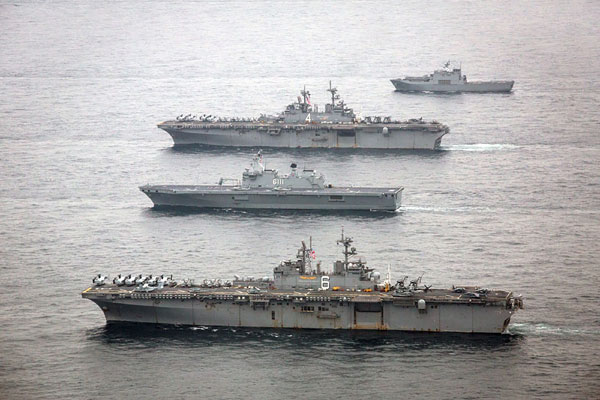China's stance on DPRK clear
 0 Comment(s)
0 Comment(s) Print
Print E-mail China.org.cn, March 10, 2016
E-mail China.org.cn, March 10, 2016
Earlier on Thursday, the Democratic People's Republic of Korea launched two short-range missiles and declared it would liquidate all of the Republic of Korea's assets in the DPRK, Xinhua reported.
|
|
| The US Navy amphibious assault ships USS Bonhomme Richard, bottom, and USS Boxer, second from top, are underway with the Republic of Korea Navy Dokdo Amphibious Ready Group in the East Sea during exercise Ssang Yong 2016, March 8, 2016. [Photo/China Daily] |
China has urged all parties to stop "provocative actions" and maintain calm and restraint to prevent tension from escalating on the Korean Peninsula.
The DPRK said it will also nullify all inter-Korean economic cooperation projects in response to Seoul's unilateral sanctions against Pyongyang, after the UN Security Council voted to adopt a tough resolution against Pyongyang earlier this month.
Foreign Ministry spokesman Hong Lei said on Thursday that "the US and the Republic of Korea have started large-scale joint military drills in the ROK, and the Democratic People's Republic of Korea has consistently responded fiercely" to what it perceives as threats.
"China expresses serious concern about the situation," he said.
Zhang Liangui, an expert in Korean studies at the Party School of the Central Committee of the Communist Party of China, said this is not the first time that the DPRK has decided to liquidate assets of the ROK, and the capital involved is "limited".
"So the decision is actually a symbolic move, serving as a protest," Zhang said.
He estimated that "it was unlikely that tension on the peninsula would lessen in the short term" because the US and its allies will continue to act in ways that prompt the DPRK to react militarily.
Shi Yongming, an Asia-Pacific studies researcher at the China Institute of International Relations, echoed Zhang, saying that the US and ROK are pressuring the DPRK militarily and politically.
At a time that the US and ROK are conducting drills on the peninsula, they also refuse to enter into negotiations unless the DPRK gives up its nuclear programs first, Shi said.
As a result, Pyongyang has no choice but to react militarily, including its recent short-range missile launches, Shi said.
"As the DPRK has no assurance that its security concerns will be addressed, it feels unsafe to engage in negotiations now about its nuclear programs," Shi added.
On Wednesday, Foreign Minister Wang Yi talked by telephone with US Secretary of State John Kerry about issues including the situation on the peninsula.
Wang said the situation is "highly charged" and China's reasonable and legitimate strategic security concerns and interests must not be damaged.
Wang clarified China's stance on the United Nations Security Council resolution on the Democratic People's Republic of Korea (DPRK) issue at a press conference on the sidelines of China's annual parliamentary session.
Wang said China and the Korean Peninsula are linked by common mountains and rivers, and China and the DPRK enjoy a normal state-to-state relationship built on a deep tradition of friendship.
Dong Xiangrong of the Chinese Academy of Social Sciences said, "One country should not be allowed to harm others' interests."
Ruan Zongze of the China Institute of International Studies (CIIS) said, "On the basis of normal state-to-state relationship, China cannot control the DPRK, an independent sovereign state, or make decisions on behalf of it."
Yang Xiyu, another CIIS researcher, said, "Responding to international circumstances, the two countries gradually shifted their relationship to a normal state-to-state one."
Also of importance is China's greater openness to new approaches that help stabilize the Korean Peninsula, Yang said.
Minister Wang said, "We are open to any and all initiatives that can help bring the nuclear issue on the Peninsula back to the negotiating table."
Zhou Wenzhong, former Chinese ambassador to the United States, said, "In light of obstacles, flexible dialogues might facilitate a gradual improvement toward the Six-Party Talks."
The Chinese foreign minister called for renewed efforts in getting back to the negotiating table.
"Resolution 2270 not just contains sanctions; it also reiterates support for the Six-Party Talks and asks the parties to refrain from taking any actions that might aggravate tensions," Wang said, adding that maintaining stability is the pressing priority and only negotiation can lead to a fundamental solution.
The continuation of peace and stability on the Korean Peninsula and in Northeast Asia is important, Yang said. "The message from the foreign minister is clear and candid."







Go to Forum >>0 Comment(s)